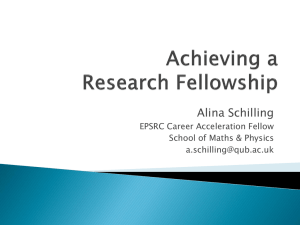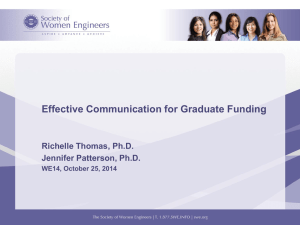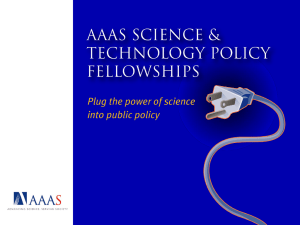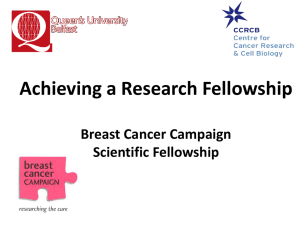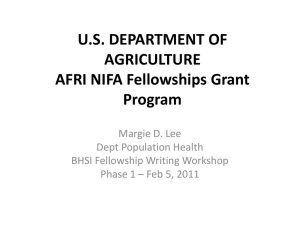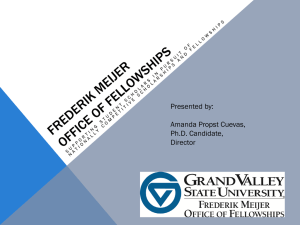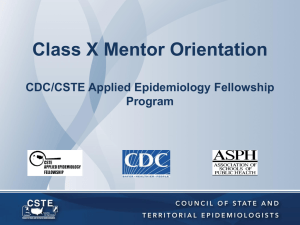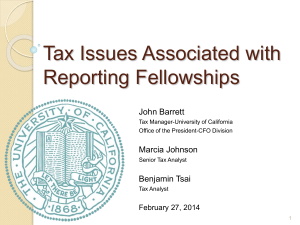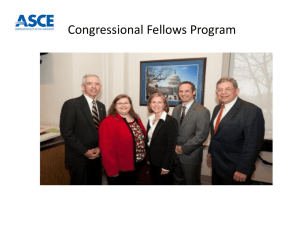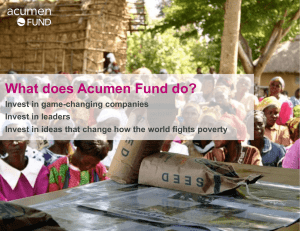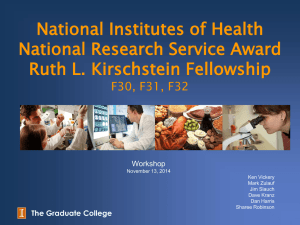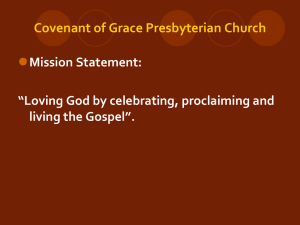What is Science Policy
advertisement
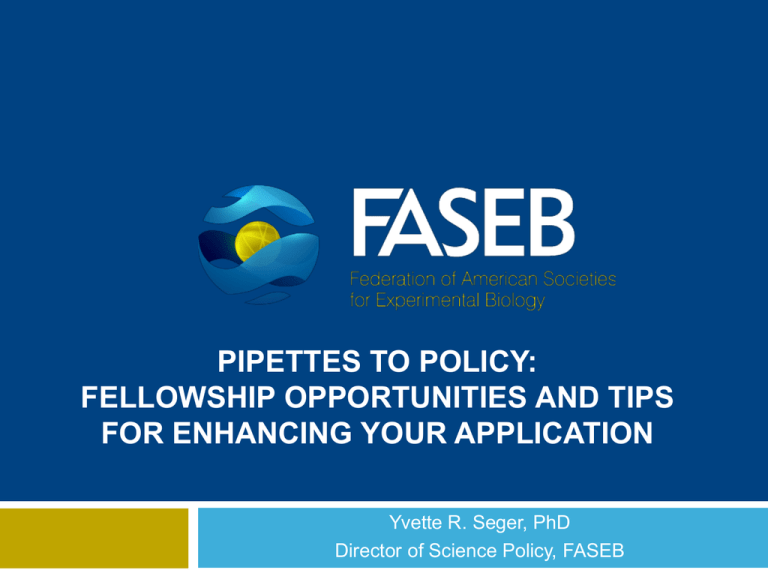
PIPETTES TO POLICY: FELLOWSHIP OPPORTUNITIES AND TIPS FOR ENHANCING YOUR APPLICATION Yvette R. Seger, PhD Director of Science Policy, FASEB Topics Covered Is science policy for you? What science policy fellowships are available? What kind of experiences will help you prepare for a career or fellowship in science policy? Tips for preparing a competitive application for a science policy fellowship Is Science Policy for You? What Is Science Policy? Science for Policy Using science to develop and drive policy decisions Policy for Science Government laws, regulations, and policies that affect scientists and the research and development enterprise The Science Policy Mentality Do you enjoy… Learning a little bit about a lot of issues (instead of a lot about one topic)? Keeping up with current events and issues in science? Interacting with people and resolving disagreements? Teaching scientific concepts (explaining scientific information to non-scientists?) A fast-paced working environment? Writing for non-scientific audiences? Working under the pressure of tight deadlines? Careers in Science Policy Where do you find science policy professionals? Government and government advisory bodies Congress White House Science agencies (NIH, NSF, etc.) National Academies Associations (scientific societies, disease organizations) Industry (pharmaceutical and biotech companies) Universities (government relations offices) Think Tanks Start Ups Science Policy Fellowships Reasons to Pursue a Fellowship Enrich scientific training with policy experience Interest in assisting with the development of policy in a specific area Desire to “test-drive” a career in policy Fellowship Goals Increase awareness of the policy process within the scientific community Incorporate subject matter experts (e.g., YOU) into the development of policy Engage researchers in advocacy activities Enhance communication skills of scientists Expand career opportunities available for PhDtrained scientists Finding a Fellowship Professional Societies/Associations Foundations Government Agencies (State & Federal) Institutional AAAS S & T Policy Fellowships Fellowships in 7 program areas: Congressional (2/cycle) Diplomacy, Security & Development (30-40/cycle) Energy, Environment, Agriculture (30-40/cycle) Health, Education & Human Services (3040/cycle) Big Data & Analytics (5-15/pilot) Judicial Branch (1-2/pilot) Roger Revelle Fellowship in Global Stewardship (1/cycle) AAAS S & T Policy Fellowships Eligibility Must hold doctoral degree Must be U.S. citizen Cannot be federal employee Three-tier Application/Review Process Application Semi-finalist Interviews Placement Interviews Commitment One-year fellowships, option for one renewal Stipend (varies) and relocation benefits AAAS S & T Policy Fellowships Congressional Fellows work on Capitol Hill Offices of Members of Congress Congressional Committees Assist in research, development and drafting of legislation and provide input to policy review and oversight AAAS places two Fellows, but also partners with ~30 professional societies to administer Congressional Fellowships Congressional Fellowship Partners Academy of Nutrition & Dietetics Acoustical Society of America American Association of Colleges of Pharmacy American Chemical Society American Geosciences Institute American Geophysical Union American Institute of Physics American Mathematical Society American Meteorological Society American Nuclear Society American Psychological Association American Physical Society American Society of Agronomy/Crop Science Society of America/Soil Science Society of America American Society of Anesthesiologists American Sociological Association American Society of Civil Engineers American Society for Microbiology American Society of Mechanical Engineers American Veterinary Medical Association Biophysical Society Federation of Animal Science Societies Geological Society of America Institute of Electric and Electronics Engineers Congressional Fellowship Partners Institute of Food Technologists Institute of Navigation Materials Research Society The Optical Society The International Society for Optics and Photonics Society for Research in Child Development Society for Mining, Metallurgy, and Exploration, Inc. Society for the Psychological Study of Social Issues Society for Automotive Engineers International The Minerals, Metals, and Materials Society AAAS S & T Policy Fellowships Health, Education, & Human Services Program Fellows placed at federal agencies Department of Health & Human Services National Institutes of Health National Science Foundation Department of Veterans Affairs Food Safety Inspection Service (USDA) Support improved programs, policies, planning, risk analysis, regulation, monitoring and evaluation for a broad range of initiatives AAAS places 30-40 Fellows per cycle Mirzayan S & T Policy Fellowship Sponsored by The National Academies 12-week fellowship with an Academies Committee, Board, or Unit $8,500 stipend Open to current graduate or professional school students or applicants within five years of completing degree Open to international applicants (F-1 [CPT or OPT], J-2 dependents, J-1 students or research scholars, DACA recipients, adjustment applicants/refugees/asylees/other select visa categories FASEB Society Fellowships American Society for Biochemistry and Molecular Biology 12-18 month Fellowship (1/cycle) Stipend and healthcare benefits Fellows work in ASBMB Office of Public Affairs Research and Analysis Advocacy Communications Recent doctoral graduate U.S. citizen or permanent resident FASEB Society Fellowships American Society for Human Genetics 16 month Fellowship (1/cycle) Rotations on NHGRI Education Office, ASHG Office, and optional third rotation (e.g., Smithsonian, NSF, etc) Advanced degree in human genetics Must be eligible to work in U.S. FASEB Society Fellowships American Association for Immunologists 12 month Public Policy Fellowship Program (up to 10/cycle) Opportunity for postdocs and early career investigators to learn about and participate in AAI’s Public Policy and Legislative Activities Participate in AAI Capitol Hill Day Attend the AAI Annual Meeting and participate in Public Policy sessions Serve on AAI Public Policy Committee FASEB Society Fellowships American Society for Nutrition 12 month Fellowships (2/cycle) Must be ASN members Based at home institution, but will travel once to D.C. during fellowship Participate in Capitol Hill and federal agency visits Mentorship component Serve on ASN’s Public Policy Committee Advanced grad students, postdocs, early career professionals, medical interns, residents, or fellows Must be eligible to work in U.S. and based at U.S. institution during fellowship FASEB Society Fellowships American Society for Pharmacology and Experimental Therapeutics 12 month Fellowships (up to 10/cycle) Must be ASPET members Based at home institution, but will travel to D.C. during fellowship Participate in Capitol Hill and federal agency visits Attend Experimental Biology (annual meeting) Serve as science advocates in home district Open to grad students, postdocs, and early career researchers (within 4 years of degree completion) Must be eligible to work in U.S. Hellman Fellowships American Academy for Arts & Sciences 12 month Fellowship (possibility of renewal) Based in Cambridge, MA Fellows contribute to ongoing projects within the Academy’s Initiative Open to grad students, postdocs, and early career researchers (within 4 years of degree completion) Must be eligible to work in U.S. Skills and Experiences Skills For Science Many scientific research skills are actually applicable to science policy… Scientific content knowledge and understanding of the scientific process Analytical and critical thinking skills Ability to learn quickly and master new topics Project management and organization Understanding how to interpret data Presentation skills Skills For Science Policy Communication Consensus Building Convey scientific information and its importance to non-scientists Non-technical writing Public speaking FASEB statements reflect the views of 27 diverse organizations Networking Being well-connected and fostering professional relationships Pathways to Careers in Science Policy Great ways to develop science policy skills: Join and participate in a scientific society or organization Contribute articles or letters to local newspapers and/or institution or society newsletters Teach or mentor in your community Volunteer at a local science museum Participate in a Capitol Hill Day Stay informed on science issues in the news Network to make contacts outside your field (and keep them) Pathways to Careers in Science Policy Great ways to develop science policy skills: Internships with institutional Offices of Government Relations, Technology Transfer, or Sponsored Research Internships with foundations or advocacy organizations Organize policy discussion groups Invite elected officials to your lab Work on a political campaign Informational interviews Preparing Your Application Application Tips Be aware of deadlines! Be sure you are eligible before you apply Provide references with relevant program information and copies of your application materials Contact program manager if you have any questions Speak with former fellows about their experiences in the program Personal Statement Avoid the trap of preparing a “one-size-fits-all” personal statement Review for grammar and spelling Avoid scientific jargon/acronyms Have multiple friends (scientific and nonscientific) review your statement Express clear areas of policy interest/focus Incorporate aspects of fellowship program to which you are attracted Curriculum Vitae/Resumé Reorganize to emphasize policy activities Beware the oversell Review for grammar and spelling Avoid scientific jargon/acronyms Speak with potential references about your career goals prior to listing them on your CV Writing Samples Preferably not scientific papers! Seek opportunities to write for institutional newsletters or press releases Many programs ask for two-page policy brief If multiple authors, be prepared to discuss your contributions Interview Prepare your personal “elevator speech” Do not assume interviewers are scientists Develop a list of questions (avoid salary!) Review key materials from website Dress for the job you want Have copies of CV, personal statement, reference contact information, and writing samples Questions? For More Information… FASEB Office of Public Affairs http://www.faseb.org/Policy-and-Government-Affairs.aspx Yvette Seger, PhD Director of Science Policy yseger@faseb.org (301) 634-7124 FASEB Policy Resources Sign-up to receive e-action alerts (http://www.faseb.org/Policy-and-Government-Affairs.aspx) Subscribe to FASEB’s Washington Update (http://washingtonupdate.faseb.org/) Follow us on Twitter - @FASEBopa Become a fan of our Facebook page Explore FASEB’s Advocacy Tool-kit (http://www.faseb.org/Policy-and-Government-Affairs/Become-an-Advocate.aspx)
